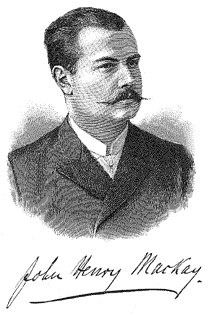John Henry Mackay
| John Henry Mackay | |
|---|---|
 | |
| Born |
6 February 1864 Greenock, Scotland |
| Died |
16 May 1933 (aged 69) Stahnsdorf, Germany |
| Pen name | Sagitta |
| Occupation | writer |
| Nationality | dual British/German |
| Genre | non fiction |
| Subject | political philosophy |
| Literary movement | naturalism |
| Notable works |
Die Anarchisten (The Anarchists) Der Freiheitsucher (The Freedomseeker) |
John Henry Mackay (6 February 1864 – 16 May 1933) was an individualist anarchist, thinker and writer. Born in Scotland and raised in Germany, Mackay was the author of Die Anarchisten (The Anarchists, 1891) and Der Freiheitsucher (The Searcher for Freedom, 1921). Mackay was published in the United States in his friend Benjamin Tucker's magazine, Liberty. He was a noted homosexual.
Life
Mackay was born in Greenock on February 6, 1864. His mother came from a prosperous Hamburg family. His father was a Scottish marine insurance broker who died when the child was less than two years old, at which point mother and son returned to Germany, where Mackay grew up.[1]
Mackay lived in Berlin from 1896 onwards, and became a friend of scientist and Gemeinschaft der Eigenen co-founder Benedict Friedlaender.
Mackay died in Stahnsdorf on 16 May 1933, ten days after the Nazi book burnings at the Institut für Sexualwissenschaft. Adolf Hitler had become Reichskanzler on 30 January 1933 and all activities of the German homosexual emancipation movement soon ceased. Allegations that Mackay's death may have been a suicide have been disputed:
Mackay died on 16 May 1933 in the office of his doctor, only a few houses from his own, apparently of a heart attack. He was also suffering from stones in his bladder.— Kennedy, Hubert. Anarchist of Love: The Secret Life of John Henry Mackay
Writing and influence
Using the pseudonym Sagitta, Mackay wrote a series of works for pederastic emancipation, titled Die Bücher der namenlosen Liebe (Books of the Nameless Love). This series was conceived in 1905 and completed in 1913 and included the Fenny Skaller, a story of a pederast.[2] Under his real name he also published fiction, such as Der Schwimmer (1901) and, again as Sagitta, he published a pederastic novel of the Berlin boy-bars, Der Puppenjunge (literally "The Boy-Doll", but published in English as The Hustler) (1926). In a note to the American publisher of this book, Christopher Isherwood said, "It gives a picture of the Berlin sexual underworld early in this century which I know, from my own experience, to be authentic."
From 1906, the writings and theories of Mackay had a significant influence on Adolf Brand's organisation Gemeinschaft der Eigenen. Mackay was also a key populariser of the work of Max Stirner (1806–1856) outside Germany, writing a biography of the philosopher which also added greatly to the understanding of the work of Friedrich Nietzsche in the English-speaking world.
Richard Strauss's well-known songs from his Vier Lieder (Op. 27), a wedding gift to his wife in 1894, include settings to music of two of Mackay's poems: "Morgen!" and "Heimliche Aufforderung". Other uses of Mackay's poems by Strauss include "Verführung" (Op. 33 No. 1) and "In der Campagna" (Op. 41 No. 2).
Arnold Schoenberg set music to his poem "Am Wegrand."
See also
References
- ↑
- Kennedy, Hubert (2002). "Mackay, John Henry (1864-1933)". glbtq: an encyclopedia of gay, lesbian, bisexual and transgender, & queer culture. glbtq.com. Retrieved August 25, 2011.
- ↑ "Richard Strauss and John Henry Mackay" by Hubert Kennedy. Thamyris 2.
Further reading
- Kennedy, Hubert. Anarchist of Love: The Secret Life of John Henry Mackay (2nd Edition, 2002)
- "On the Nameless Love and Infinite Sexualities: John Henry Mackay, Magnus Hirschfeld and the Origins of the Sexual Emancipation Movement", Journal of Homosexuality, Vol 50, No.1, 2005.
External links
- Joohn Henry Mackay (1864-1933) Find A Grave memorial
- Works by John Henry Mackay at Project Gutenberg
- Works by or about John Henry Mackay at Internet Archive
- Works by John Henry Mackay at LibriVox (public domain audiobooks)

- Bike tour to John Henry Mackay’s grave
- Thomas A. Riley, New England Anarchism in Germany. Retrieved Feb 2, 2008.